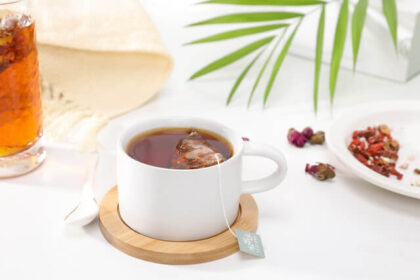
TEA FOR THE THIRD & FOURTH TRIMESTER OF PREGNANCY
Tea is a great way to naturally support your body and mind when you are preparing to meet your baby at the end of pregnancy. It can be a daunting time, and relaxing with a cup of tea, can be a micro-moment of self-care in your day. But most importantly, the right herbs and flowers can support you even more.
Uterine Strength- The Final Push Raspberry Leaf Tea
Raspberry leaves have been used for millennia by women to support them in the third trimester of pregnancy. There are now some small scale studies that suggesting that this traditional use is well founded.
A study involving rats found that when fragrine is placed on tissue from pregnant rat uteri, it causes contractions to occur1. Fragrine is a key active component of raspberry leaf tea and is therefore believed that some women experience Braxton hicks’ contractions when they drink raspberry leaf tea.
A placebo-controlled trial2, consisting of 192 low-risk women in Australia found that when taking raspberry leaf tea from 32 weeks until labour, had no adverse effects for mother or baby. However, of note, it found a lower rate of forceps deliveries (19.3% vs. 30.4%). A study including the same authors3 found of 108 mothers; 57 (52.8%) consuming raspberry leaf products, whereas 51 (47.2%) were in the control group. They had an unexpected finding of a reduced likelihood to receive an artificial rupture of their membranes (“having their waters broken”) and decrease the likelihood of post-term gestation (“going over-due”).
The recommendation is drinking one cup of tea a day from 32 weeks, then increasing to 2 cups a day after 1-2 weeks, and then to 3 cups a day after a further 1-2 weeks. However, it is always best to consult your midwife or doctor before drinking raspberry leaf, just to ensure that they are happy with your progression.
Relaxation- Night Owl
Our bodies are designed to birth babies, but this doesn’t mean that you won’t feel nervous or concerned in the build up to giving birth. Having a cup of Night Owl tea can hopefully help increase calm and hopefully aid a better night’s sleep. It’s also the perfect accompaniment to hypnobirthing practice. It is a blend of many anti-inflammatory and calming herbs.
Chamomile flowers
Whole chamomile flowers are used as the base of the blend. This flower has a long history of use to aid sleep, and studies now show that it can help ease feelings of anxiety.
Research has shown that chamomile can decrease anxiety both in the long and short term as well as depression, with a demonstration of its long-term effect on those with generalized anxiety disorder in a placebo-controlled trial. They found that the chamomile group had 40% fewer anxiety relapses during their treatment period4.
Lavender
Like chamomile, lavender has a long history of being used to bring calm and aid sleep. This long history of anecdotal evidence is backed up in a literature review on the efficacy of lavender5. The aromatic compound in lavender is high in linalool, which has been tested and shown to reduce feelings of anxiety. But interestingly, breathing in lavender is less effective than consuming it5. Therefore, having a drink of tea with lavender in it will be more effective than simply breathing in a pillow spray.
Valerian root
Valerian has a strong sedative effect when taken in large amounts, so it is added to the blend only in a small quantity. This is to ensure it is safe for pregnancy and breastfeeding, a study was undertaken in Sweden6 where the effects of herbal drugs were studied, showed no adverse effects on women through pregnancy. It is, however, recommended to stick to the NHS guidance of not having more than 4 cups of any one herbal tea per day.
Breastfeeding – Milk’s Up Breastfeeding Tea
In order to try to have a better chance of establishing milk supply easily, you can harvest colostrum at the end of your pregnancy. This has been linked in research to help establish milk supply, and it also means you can freeze the colostrum and have some of the liquid gold in your freezer, to top your baby up with when they come home. If you’re wondering how to express milk, there is some really great advice here from the Association of Breastfeeding Mothers.
We also recommend drinking our Milk’s Up breastfeeding tea, to keep your body hydrated and well nourished. The ingredients are hand selected herbs and spices that have been used for millennia as natural galactagogues, to support milk production. Small scale research is now showing several of the key ingredients improve milk supply and fat content of milk – fenugreek and fennel in particular.
Drinking up to 3 cups a day, along with hand expressing milk, can hopefully help prepare your body for when your baby arrives.
Then drink it daily to help give yourself support when you need it.
We recommend talking to your midwife about when to start hand expressing milk, as some advise to wait until you’re full term, just in case the production of oxytocin induces labour. There’s no reason not to drink the tea earlier, but it isn’t really necessary until you’re expressing too. This is the key thing for increasing milk supply, and the tea is a great support.
Written by Bethan Thomas, founder of HotTea Mama
Having worked as a tea buyer and blender for over 18 years, and becoming the first non-Chinese person to get a degree in Tea Science at the University of Forestry and Agriculture in Fujian, Bethan was inspired to set up HotTea Mama after having children in 2017.
With her best friend Kate, they developed a tea range to support wellness, specifically around reproductive health. From periods to pregnancy, motherhood to menopause – there is a tea for you.
A full range of teas to support each stage of pregnancy can be found on hotteamama.com
REFERENCES
- Jing Zheng, Pistilli, M. J., Holloway, A. C., & Crankshaw, D. J. (2010). The effects of commercial preparations of red raspberry leaf on the contractility of the rat’s uterus in vitro. Reproductive sciences (Thousand Oaks, Calif.), 17(5), 494–501. https://doi.org/10.1177/1933719109359703
- Simpson, M., Parsons, M., Greenwood, J., & Wade, K. (2001). Raspberry leaf in pregnancy: its safety and efficacy in labor. Journal of midwifery & women’s health, 46(2), 51–59. https://doi.org/10.1016/s1526-9523(01)00095-2
- Parsons, M., Simpson, M., & Ponton, T. (1999). Raspberry leaf and its effect on labour: safety and efficacy. Australian College of Midwives Incorporated journal, 12(3), 20–25. https://doi.org/10.1016/s1031-170x(99)80008-7
- Mao, J. J., Xie, S. X., Keefe, J. R., Soeller, I., Li, Q. S., & Amsterdam, J. D. (2016). Long-term chamomile (Matricaria chamomilla L.) treatment for generalized anxiety disorder: A randomized clinical trial. Phytomedicine : international journal of phytotherapy and phytopharmacology, 23(14), 1735–1742. https://doi.org/10.1016/j.phymed.2016.10.012
- Appleton, J. (2012) Lavender Oil for Anxiety and Depression: Review of the literature on the safety and efficacy of lavender. Natural Medicine Journal, 4(2). Available at: https://www.naturalmedicinejournal.com/journal/2012-02/lavender-oil-anxiety-and-depression-0
- Holst, L., Nordeng, H., & Haavik, S. (2008). Use of herbal drugs during early pregnancy in relation to maternal characteristics and pregnancy outcome. Pharmacoepidemiology and drug safety, 17(2), 151–159. https://doi.org/10.1002/pds.1527




You must be logged in to post a comment.